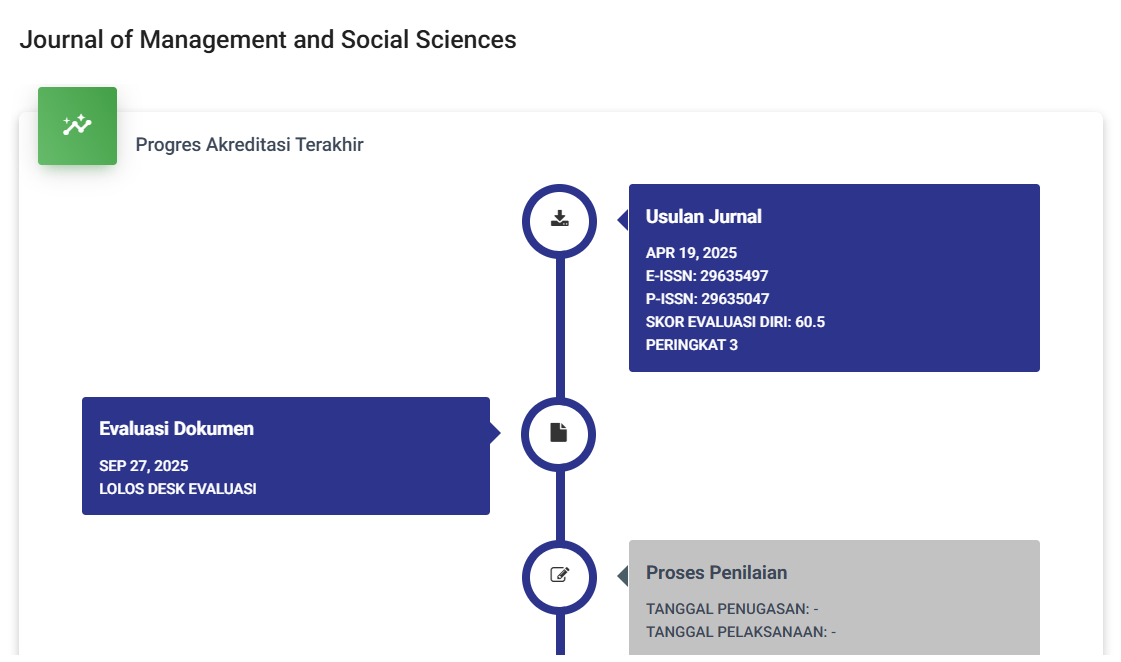ANALISIS MANAJEMEN RESIKO PEMBIAYAAN PEER TO PEER LENDING (P2PL) FINTECH SYARIAH (STUDI KASUS PADA PT ALAMI SYARIAH)
DOI:
https://doi.org/10.55606/jimas.v1i4.62Keywords:
P2PL Syaria, Fintech, ALAMIAbstract
One form of progress in the current financial sector is evidenced by the adaptation of Fintech, which stands for sharia P2PL Financial Technology. Financial institutions in carrying out their activities cannot be avoided what is called risk. That's why to gain profit and customer trust, financial institutions are required to have good risk management, especially fintech companies that offer convenience and efficiency in transactions, so they will be very vulnerable to various types of risks in the financing process that can affect the sustainability of the fintech itself. fintech companies, before channeling financing to potential recipients of funds, also need to be able to pay attention to various risks that may arise, both predictable and not, and also have techniques for mitigating risks from all possibilities that may occur in the future, so there is a need for strategic steps and ways to minimize existing risks. This type of research is empirical and uses a qualitative approach with secondary data source. From the explanation, it can be said that PT ALAMI Sharia has carried out Sharia fintech P2PL transactions that are following existing economic principles starting from the identification of potential recipients of funds, analysis carried out by PT ALAMI and risk mitigation carried out by PT ALAMI Syariah.
References
Aniek Rumijati et. al, Kemandirian Ekonomi Dan Bisnis Indonesia Menghadapi Era Revolusi 4.0 (Malang: Universitas Muhammadiyah Malang, 2020), 238
ALAMI e-magazine: Percikan Semangat Integrasi Teknologi & Ekonomi Syaria, Vol 1, Jakarta: ALAMI Sharia, 2020, blog.alamisharia.co.id.
Ebook ALAMI: Get to Know Peer to Peer (P2P) Financing with ALAMI, (Jakarta: ALAMI Sharia, 2020), blog.alamisharia.co.id.
Gunawan, I. (2015). Metode penelitian kualititaif. Jakarta, Indonesia: Bumi Aksara.
Hapsari Wibowo. Analisis Modal Intelektual Pada Organisasi Penyedia Jasa Urun Dana (Crowdfunding Platform) Di Indonesia (Studi Pada Kitabisa.Com Periode 2013-2016, Skripsi, Yokyakarta: Universitas Gadjah Mada, 2017
Nadia Intan, Perlindungan Hukum Pihak Pemberi Pinjaman pada Layanan Pinjaman Pendidikan berbasis Teknologi Informasi terhadap Risiko Gagal Bayar, Jurnal Jurist-Diction, Vol. 3, No. 2, (Maret: 2020)
Nazir, M. (2003). Metode penelitian. Bandung, Indonesia: Ghalia Indonesia.
Nurhasanah & Indra Rahmatullah, Financial Technology and The Legal Protection of Personal Data: The Case of Malaysia and Indonesia, Jurnal Al-Risalah, Vol. 20, No. 2, 2020.
Nurhalis, Perlindungan Konsumen dalam Perspektif Hukum dan Undang-Undang Perlindungan Konsumen, Jurnal IUS Kajian Hukum dan Keadilan, Vol. III, No.9, (Desember: 2015)
Peraturan Otoritas Jasa Keuangan (POJK) No. 13/POJK.02/2018 tentang Inovasi Keuangan Digital di Sektor Jasa Keuangan.
Rahmat, J. (1997). Metodologi hukum. Jakarta, Indonesia: Fajar Agung








